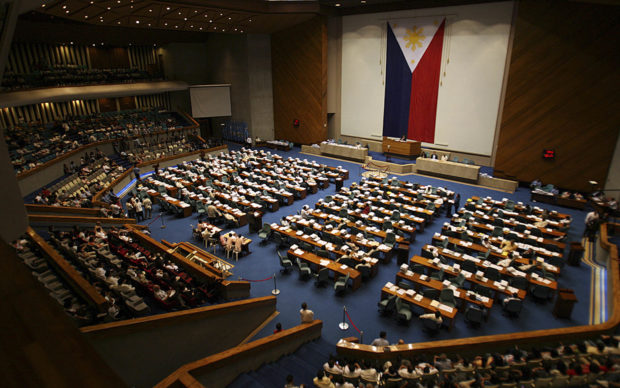
BATASAN PLENARY HALL / INQUIRER FILE PHOTO
MANILA, Philippines — The House of Representatives has adopted a concurrent resolution expressing support for the administration’s Medium-Term Fiscal Framework (MTFF), despite some lawmakers questioning why the chamber even needs the said resolution.
A huge chunk of Monday’s session was allotted to the discussion of House Concurrent Resolution No. 2, which seeks to support the 2022-2028 fiscal framework set by President Ferdinand Marcos Jr.’s administration.
During the period of interpellation, minority lawmaker Albay 1st District Rep. Edcel Lagman asked the resolution’s sponsor, Marikina 2nd District Rep. Stella Luz Quimbo, why there is a need to pass the said measure given that past versions of the Congress have not made such moves.
Lagman also noted that the MTFF appeared in past administrations as mere planning targets by the government, usually briefed to lawmakers before budget deliberations.
“I have been also a member of this august chamber for a number of terms, I don’t recall that this Congress passed a concurrent resolution approving or supporting the administration’s medium term fiscal framework,” Lagman said.
“Wala, I recall Ms. Speaker, that during previous administrations, we had also this targets and assumptions. As a matter of fact, before we start the budget hearings, there’s this meeting wherein the DBCC (Development and Budget Coordination Committee) would project these targets and assumptions to guide us in the process of approving the national budgets,” Lagman added.
Quimbo explained that the House adopting the resolution is important as the framework indicates the policy direction the Marcos administration would use in the next six years.
Under the MTFF, the government set a goal of 6.5 percent to 7.5 percent real gross domestic product (GDP) growth for 2022, and 6.5 percent to 8.0 percent real GDP growth annually from 2023 to 2028. A single-digit poverty incidence is also aimed, while the government expects a three percent deficit-to-GDP ratio by 2028.
“Simple lang po, sa madaling salita, sa kahit na anong larangan, lalo na po na kung mayroong budget requirement, napaka importante po na meron tayong guiding principles na ina-adopt,” Quimbo explained.
“So although this is the first time that we are proposing to do this, at the start of every budget deliberation, we always sit down with the economic managers and they lay down the assumptions, they tell us what the targets are and they identify for the priority programs are,” she added.
After the interpellations ended, the concurrent resolution — filed by Speaker and Leyte 1st District Rep. Ferdinand Martin Romualdez, Majority floor leader Zamboanga City 2nd District Rep. Manuel Jose Dalipe, and Minority floor leader 4Ps Rep. Marcelino Libanan — was adopted via viva voce voting.
However, Lagman was still unsatisfied with the resolution and abstained from voting, noting some issues with a lower budget deficit that the current administration seems to favor over expenditures that can stimulate the economy.
The Albay lawmaker also asked how liberalization of the economy through allowing foreign ownerships of vital companies, which the administration is supposedly pushing for, would coincide with the 1987 Constitution that prevents full foreign ownership.
“One, budget deficit is not essentially bad, however, the effort to reduce the budget deficit should not be given premium over rational expenditures to continue pump-priming the economy. Consequently, how is government initiative for growth reconciled with the planned reduction of the budget deficit to three percent only of the GDP (gross domestic product)?” he asked.
“Number two, how is economic liberation like 100 percent ownership of foreign corporations and investors of strategic industries like communication and transportation reconcile with the constitutional mandate of achieving an economy effectively controlled by Filipinos, and a 60 percent ceiling of foreign ownership of public utility enterprises?” he added.
Preparing for budget talks
But for another Albay lawmaker in Rep. Joey Salceda, adopting a resolution supporting the MTFF is a good start and preparation before Congress deliberates the first proposed budget of the Marcos administration.
According to Salceda, an economist by profession, it is a step on the right track as it follows international best practices in tax policymaking.
“(Supporting the MTFF is a) step towards following international best practices on tax policymaking and codification of the Marcos administration’s covenant with the Filipino people on key economic and fiscal objectives,” he said.
Salceda also believes that the goals set in the MTFF are attainable.
“These are attainable goals, but we need to discuss in the budget framework how we can achieve the goals this year and every year since,” Salceda said.
“We also need to raise the necessary revenues through both tax reforms and through tax collection efficiency and better enforcement. The implicit assumption behind the MTFF is that by 2028, we can achieve 17.6% revenue-to-GDP,” he added.
Congress is expected to receive copies of the 2023 proposed budget by August 22, or days before the deadline set by the 1987 Constitution.
READ: Palace: DBM to submit proposed 2023 budget to Congress on Aug. 22

